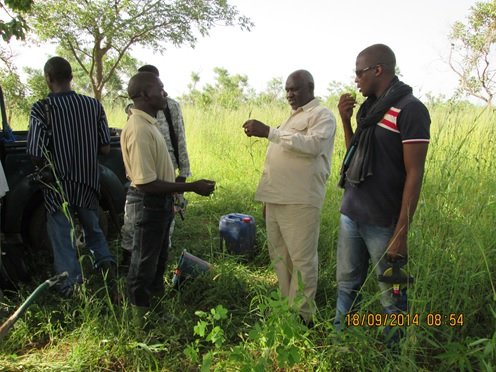|
Cycle 8 (2019 Deadline)
Development of hay production techniques for livestock fattening and agro-pastoral resilience in the western Sahel of Mali
PI: Moussa Karembe (mkarembe@yahoo.fr), University of Sciences, Techniques, and Technologies of Bamako
U.S. Partner: Niall Hanan, New Mexico State University
Project Dates: December 2019 - June 2021
Project Overview:
 | | The project team discusses field productivity with farmers (photo courtesy of Dr. Karembe). |
The objectives of this project are to strengthen the economic development, food security, and resilience of rural pastoral and agro-pastoral communities in the Western Sahel of Mali. Specifically, the principal investigator and his colleagues will design and implement demonstration projects in the administrative districts of Koutiala and Yorosso (Region of Sikasso) and Nioro and Dièma (Region of Kayes), providing rural pastoralists and agro-pastoralists with new strategies for small ruminant well-being during the late dry season (or “lean season”), when lack of forage, high livestock mortality, and animal weight loss and reproductive failure are common problems faced by Sahelian producers. The project will begin with an assessment of animal nutrition and an economic cost-benefit analysis of hay and/or silage production across a rainfall gradient from the dry Sahel to the mesic Sudanian savannas. The researchers will then examine the potential interactions between herbaceous production and nutritional status across the gradient climatic that might favor hay production over silage, or vice versa. They will also develop and implement methods to monitor land use and forage production in the grazing lands of southern Mali using available satellite data and cloud-based computation.
In addition to these specific research objectives, key development goals for the project include demonstrating hay and silage production opportunities to rural pastoralist communities to provide feed supplements during the dry or lean season. The project is also expected to provide opportunities for small producers (in particular, women and youth) to increase health, growth, and reproductive success of their small ruminants (sheep and goats) and thus improve the nutritional wellbeing of their families during the dry season. There should be increased market engagement and reduced unemployment among rural youth and graduates of the livestock sector through innovation in small ruminant fattening and enhanced engagement in the livestock value chain. By helping to provide alternative food sources/feed supplementation for livestock and thus reducing incursions of livestock into agricultural fields in search of food, these researchers’ efforts should also help to mitigate conflicts between pastoralists and farmers. In the future, as part of the development of its livestock sector, Mali must develop strategies to increase feed supplementation and fattening of livestock in order to improve productivity and increase value and economic returns of animals sent to market. These strategies should include the development of appropriate hay harvesting and conservation techniques to utilize available Sahel forage. It is in this context that the present PEER project is located.
Final Summary of Project Activities
This project demonstrated the production opportunities for highly nutritional hay if the biomass is harvested at the end of the rainy season to rural pastoral communities in the Sahelian zones of Dièma and Nioro. This is in contrast to herders of the Sudanese zones, Koutiala and Yorosso, where pastures are rare and of low nutritional value. Herders in these zones were shown that they must cultivate forages during rainy the season in order to provide supplemental feed for their animals during the dry season. Doing so will allow small producers to improve the health, growth, and reproducibility of their animals, and therefore the nutritional well-being of their families, during difficult times. The preliminary results and overall project objectives were shared with stakeholders and received media coverage, thereby reaching a greater number of communities, as well as highlighting how its adoption may protect these communities and the environment by reducing late season bush fires.
The project also contributed to reducing unemployment among young graduates from the livestock sector who did their end-of-cycle internship for the project. After acquiring experience with the project, they moved to promoting innovation in the livestock sector and increasing the value chain in the Sahel.
Additionally, through the project, the team was able to strengthen inter-university collaboration between the UTTB of Mali and the UAC of Benin. Promising ideas have been developed for joint research and student exchange programs.
Publications
Kanambaye B., Karembé M., Niall H., Dembélé F., et Diallo S. Détermination du potentiel pastoral herbacé des parcours dans les communes rurales de Dièma et Guétéma du Sahel occidental au Mali. 15ème JSD_C, Dakar Sénégal, 15p.
Kanambaye B., Traoré L., Karembé M., et Niall H., 2020. Impact des changements climatiques sur l’évolution du système d’élevage transhumant au Mali: Cas des zones de Nioro et Diéma dans la région de Kayes au Mali. MSAS, 11ème Conférence du 21-23 déc. 2020 ; Vol 2, pp : 635- 643.
Karembé M., Dembélé F., Kanambaye B., et Diagneo A. Effet du feu et de la pâture sur le potentiel des ligneux en zone soudano-sahélienne au Mali: cas des terroirs de Lakamané et de Korokodio dans la région de Kayes. 1ère JSD-DER-Bio-FST/USTTB, 14 novembre 2020 ; Bamako, Mali, 17p.
Karembé M., Kanambaye B., Dembélé F., et Diallo S. Caractérisation du potentiel fourrager herbacé pour l’embouche ovine au Mali : cas des terroirs de Diéma et de Guétéma dans la région de Kayes. 1ère JSD-DERBio- FST/USTTB, 14 novembre 2020 ; Bamako, Mali, 15p.
Back to PEER Cycle 8 Grant Recipients
|
|
|
|




